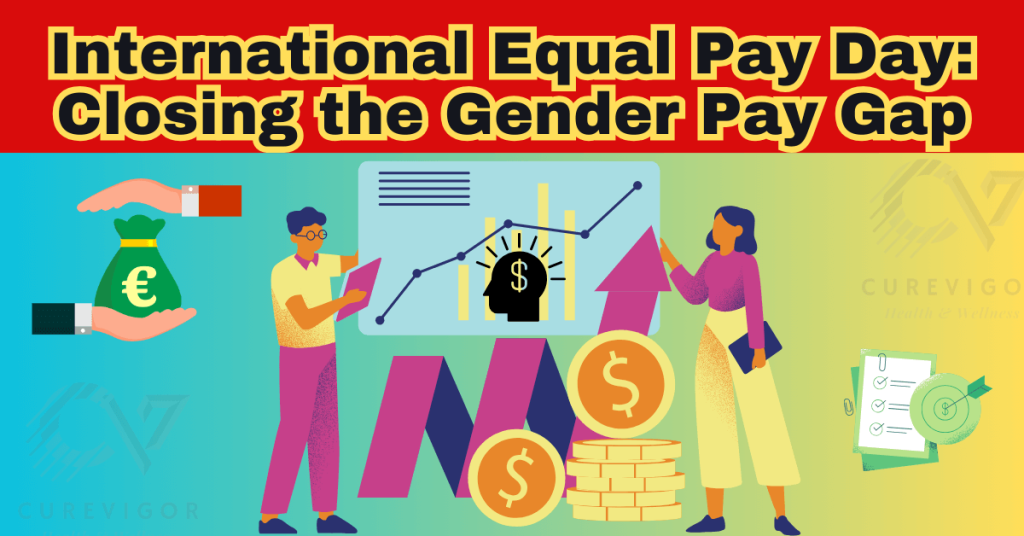Explore practical financial advice for women on International Equal Pay Day. Learn how to bridge the gender pay gap and build financial independence.
Contents
- 1 Closing the Gender Pay Gap and Achieving Financial Independence
- 2 Closing the Gender Pay Gap: A Vital Challenge
- 3 Negotiating Your Salary | Mastering the Art of Negotiation
- 4 Investing in Education and Skills | Lifelong Learning
- 5 Building Multiple Income Streams | Diversify Your Income
- 6 Achieving Financial Independence
- 7 Boosting Your Financial Health on International Equal Pay Day
- 8 Closing the Gender Pay Gap and Improve Your Financial Health
- 9 Key Strategies on the Gender Pay Gap and Improve Your Financial Health
Closing the Gender Pay Gap and Achieving Financial Independence
International Equal Pay Day is a poignant reminder of the persistent gender pay gap that women face worldwide. The pay gap remains an issue despite recent progress. Long-term financial consequences can arise when women earn less than men.
On this International Equal Pay Day, we’re committed to addressing this disparity and empowering women to take control of their financial futures. This comprehensive guide will provide practical financial tips for women to bridge the pay gap, achieve economic independence, and secure a prosperous future.
Closing the Gender Pay Gap: A Vital Challenge
Awareness is the First Step
It’s essential to start by deeply understanding the issue to address the gender pay gap effectively. Begin by researching and gathering information on your industry, region, and occupation pay disparities. Seek out salary surveys, industry reports, and pay data to identify the extent of the gap.
Why Awareness Matters
Awareness is the foundation of change. By knowing the magnitude of pay disparities, you can effectively articulate the problem and advocate for fair compensation. Understanding the specific challenges in your field or region helps you tailor your efforts toward closing the gap where it matters most.
Negotiating Your Salary | Mastering the Art of Negotiation
Salary negotiation is a crucial skill that empowers individuals, especially women, to bridge the gender pay gap. Whether you find an offer of a new job or a promotion, it’s vital not to hesitate when negotiating for fair compensation.
Why Negotiation Matters: When you negotiate your salary, you assert your worth and ensure you are paid equally to your male counterparts—practice negotiation techniques such as researching industry salary standards and preparing persuasive arguments.
Be confident in making your case for fair compensation, and don’t settle for less than you deserve.
Investing in Education and Skills | Lifelong Learning
Investing in your education and skills is a strategic move to boost your earning potential and narrow the pay gap. Consider pursuing additional qualifications, certifications, or advanced degrees relevant to your field.
Why Lifelong Learning Matters: Continuous learning keeps you competitive in the job market. It allows you to stay up-to-date with industry trends and acquire skills in demand. The more valuable your skill set is, the stronger your position is to negotiate for higher pay and secure well-paying opportunities.
Building Multiple Income Streams | Diversify Your Income
Relying solely on a traditional job can limit your income potential and financial security. To overcome this limitation, explore opportunities for multiple income streams, such as freelancing, consulting, or investing.
Why Diversification Matters: Diversifying your income sources reduces financial vulnerability. It provides stability during economic downturns and opens up opportunities for higher earnings. By cultivating various income streams, you can better position yourself to achieve financial independence and bridge the pay gap.
Achieving Financial Independence

Creating a Budget
Financial Planning: Start your journey toward financial independence by creating a detailed budget. Your budget should outline your income, expenses, and savings goals. This comprehensive financial plan enables you to manage your finances effectively and track your progress toward financial independence.
Establishing an Emergency Fund
Financial Safety Net: One essential component of financial independence is establishing an emergency fund. This fund is a financial safety net, covering unexpected expenses such as medical bills or car repairs. This safety net ensures you won’t rely on credit cards or loans during unforeseen financial emergencies.
Investing Wisely
Growing Your Wealth: Learning (about different investment options, such as stocks, bonds, and real estate) will help you achieve financial independence. Invest wisely based on your financial objectives and risk appetite. Over time, intelligent investments can help your wealth grow and secure your financial future.
Planning for Retirement
Securing Your Future: Plan for early retirement to ensure financial independence in your later years. Contribute consistently to retirement accounts like a 401(k) or IRA. Regular contributions and compound interest can provide the financial security you need for a comfortable retirement.
Planning for retirement is a crucial step toward achieving lasting financial independence.
Boosting Your Financial Health on International Equal Pay Day
International Equal Pay Day is a significant occasion that highlights the ongoing struggle for pay equity between genders. It serves as a reminder that, despite considerable progress, the gender pay gap still exists.
Today, it’s crucial to advocate for equal pay and take proactive steps to boost your financial health, regardless of gender. Here are some actionable tips to help you achieve economic well-being:
- Know your Worth: Research salary benchmarks in your industry and region. Understanding the market value of your skills and experience empowers you to negotiate for fair compensation.
- Negotiate Your Salary: Feel free to negotiate your salary when offered a job or a promotion. Effective negotiation can significantly impact your long-term financial health.
- Budget Wisely: Create a detailed budget that outlines your income, expenses, and savings goals. Budgeting helps you manage your finances effectively and identify areas where you can save more.
- Build an Emergency Fund: Establishing an emergency fund with three to six months’ living expenses ensures financial stability during unexpected situations.
- Invest for the Future: Learn about investment options and invest in growing wealth. Make wise choices that align with your financial objectives and risk appetite.
- Prioritize Retirement Planning: Begin planning early by contributing to retirement accounts like a 401(k) or IRA. A well-funded retirement plan ensures financial security in your later years.
- Promote Financial Literacy: Invest time in improving your financial literacy by reading books, taking courses, and seeking advice from financial experts. You are more prepared to make wise financial decisions the more you are aware of.
- Support Equal Pay: Advocate for equal pay for yourself and all individuals. Encourage workplace policies and initiatives that promote pay equity.
International Equal Pay Day is not just a day of recognition; it’s a call to action. By proactively enhancing your financial health and supporting pay equity, you contribute to a fairer, more prosperous future for everyone.
Closing the Gender Pay Gap and Improve Your Financial Health
The gender pay gap has been a persistent issue, but it’s essential to recognize that there are actionable steps both individuals and society can take to address this imbalance.
Closing the gender pay gap promotes social justice and improves individual financial health.
Key Strategies on the Gender Pay Gap and Improve Your Financial Health
Here are key strategies to consider:
- Salary Negotiation: Women often face challenges in negotiating their salaries. It’s crucial to advocate for fair compensation. Practice negotiation skills, research industry standards, and confidently Continuous Education: discuss your worth with employers.
- Invest in your education and skills development. Lifelong learning can lead to better job opportunities and increased earning potential.
- Supportive Workplace Policies: Encourage and support policies that promote pay equity, such as transparent salary structures and anti-discrimination measures.
- Financial Literacy: Enhance your financial literacy to make informed decisions about investments, savings, and retirement planning. Knowledge is vital to building financial security.
- Diverse Income Streams: Consider diversifying income sources, such as freelancing, side gigs, or investments. Multiple income streams provide stability and financial resilience.
- Retirement Planning: Plan early and regularly contribute to retirement accounts. A well-funded retirement plan ensures financial independence in later years.
- Advocacy: Join and support organizations and movements for gender pay equality. Collective efforts can drive systemic change.
By taking these steps, individuals can not only contribute to closing the gender pay gap but also enhance their financial health. When women receive fair compensation, their financial well-being strengthens, leading to greater economic security and opportunities for themselves and future generations.
FAQs
Q. How can the gender pay gap be closed?
Closing the gender pay gap requires implementing policies and practices that promote pay equity. This includes transparent salary structures, addressing unconscious bias in hiring and promotions, offering parental leave and flexible work arrangements, advocating for equal pay legislation, and promoting gender diversity in leadership positions.
Q. What are some solutions to closing the gender wage gap?
Solutions to closing the gender wage gap include:
- Implementing pay transparency measures.
- Conducting regular pay inspects to identify and address disparities.
- Providing negotiation training for women.
- Offering family-friendly policies such as childcare support and paid parental leave.
- Enforcing anti-discrimination laws.
- Promoting equal presentation of women in leadership roles.
Q. How do you achieve gender equality in pay?
Achieving gender equality in pay involves:
- Implementing fair and transparent compensation practices.
- Conducting regular pay equity analyses.
- Addressing biases in recruitment and promotion processes.
- Providing negotiation training for all employees.
- Ensuring access to family-friendly policies and support.
- Advocating for legislative measures that promote pay equity.
Q. How can the gender pay gap be resolved?
Resolving the gender pay gap requires a multi-faceted approach, including implementing fair pay practices, addressing systemic biases in hiring and promotion, providing training and support for negotiation skills, offering family-friendly policies, enforcing anti-discrimination laws, and promoting gender diversity in leadership positions.
Q. How to ensure equal pay?
Ensuring equal pay involves:
- Establishing clear and transparent pay structures.
- Conducting regular pay examines to identify and address disparities.
- Providing negotiation training for employees.
- Implementing policies to prevent discrimination and bias in compensation decisions.
- Promoting a culture of pay equity and inclusion.
Q. What are the policies for the gender pay gap?
Policies addressing the gender pay gap may include pay transparency measures, equal pay legislation, mandatory pay audits for companies, promotion of flexible work arrangements, parental leave policies, anti-discrimination laws, support for affordable childcare, and initiatives to promote women’s representation in leadership roles.
Conclusion on Closing the Gender Pay Gap
On International Equal Pay Day, we celebrate the progress in closing the gender pay gap while acknowledging the remaining work. Women deserve equal pay for equal work. By understanding the pay gap, negotiating your salary, investing in education and skills, and taking control of your financial future, you can bridge the gap and achieve financial independence.
Remember that economic empowerment is a journey; with determination and knowledge, you can secure a brighter financial future for yourself and future generations.
Read more articles on Health and Wellness.
You might like to read:
How to Unlock Affiliate Marketing Secrets and Skyrocket Your Online Earning Potential
The Ultimate Migraine Prevention Guide: Foods to Avoid and Dietary Tips



